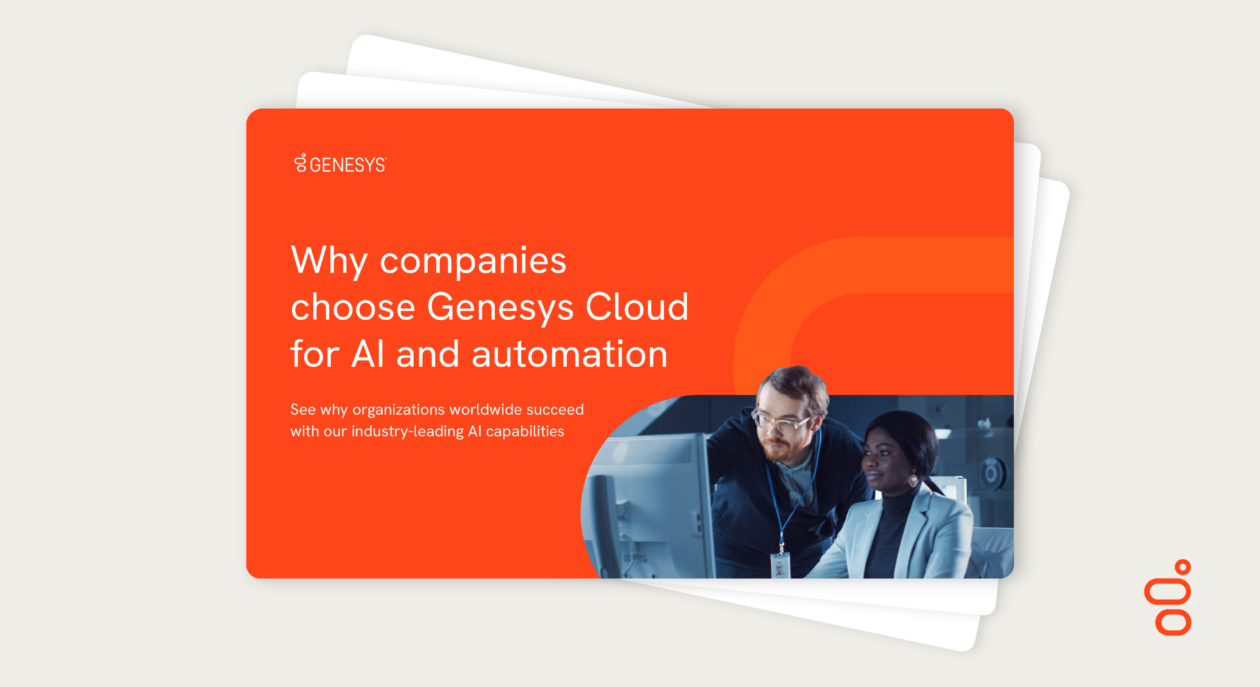Your Genesys Blog Subscription has been confirmed!
Please add genesys@email.genesys.com to your safe sender list to ensure you receive the weekly blog notifications.
Subscribe to our free newsletter and get blog updates in your inbox
Don't Show This Again.

As customer expectations continue to rise, organisations are increasingly turning to artificial intelligence (AI) to shift from reactive to proactive service. While traditional customer experience (CX) models often address issues after they’ve occurred, AI allows companies to better anticipate needs and deliver solutions before customers even realise a problem exists.
This proactive strategy transforms CX by enhancing predictive engagement and enabling preemptive customer outreach. And that can make AI an invaluable tool for forward-thinking businesses.
The conventional CX approach typically relies on customers initiating contact when they encounter an issue — a reactive service model that can leave customers feeling frustrated and undervalued. Proactive CX, powered by AI, flips this script. It enables businesses to anticipate needs and then reach out to customers before issues arise. It also enables them to proactively resolve issues without needing to notify customers at all.
According to the Genesys report, “Customer experience in the age of AI,” 72% of CX leaders surveyed believe that, in the future, artificial intelligence will facilitate all proactive service outreach, underscoring its critical role in CX transformation.
This shift to proactive service is about more than meeting customer needs; it’s also about fostering trust and loyalty. According to the report, 59% of CX leaders surveyed expect that adopting AI for customer experience will lead to increased customer loyalty and lifetime value.
By leveraging AI’s predictive capabilities, organisations can deliver personalised, relevant support that feels attentive rather than intrusive. AI can detect patterns in customer behaviour, identify potential issues and provide timely solutions — all without the customer lifting a finger. With its ability to predict and cater to customer needs proactively, AI can do more than just improve CX. It helps to build long-term customer engagement.
Predictive engagement and proactive outreach are central to AI-driven proactive service. And both are especially impactful in industries where customer loyalty is closely tied to timely and efficient service.
With predictive engagement, AI can analyse vast amounts of customer data in real time to identify potential pain points, preferences and upcoming needs, allowing companies to preemptively engage customers. For example, artificial intelligence tools might detect that a customer’s purchasing patterns and site behaviours indicate they’ll soon need product support. Rather than waiting for the customer to reach out, the organisation can proactively offer resources, tips or troubleshooting support.

Proactive outreach goes hand in hand with predictive engagement, reducing customer effort by addressing issues before they escalate. Instead of forcing customers to navigate service channels to solve problems, AI-driven outreach helps provide the right assistance through the right channel — at the right time.
For instance, if AI identifies that a customer has encountered a recurring technical issue, it can automatically send a personalised message offering a solution or connecting them with a knowledgeable agent. This can not only streamline the customer journey but also reduce frustration and saves valuable time for both the customer and the service team.
It’s no wonder that 66% of CX leaders surveyed believe that AI will make their CX teams more engaged, as proactive outreach frees up employees to handle complex tasks, while AI handles the routine issues.
Proactive outreach extends beyond problem-solving to deliver value through personalised offers and recommendations. AI-driven systems can analyse purchasing history and behavioural data to make timely, relevant recommendations that align with each customer’s unique preferences — during self-service and agent-led interactions. This “next-best-action” approach enables businesses to deepen customer engagement by showing customers that they’re understood and valued.
Predictive analytics is foundational to proactive service. AI-powered predictive analytics allows businesses to gather insights from customer interactions, behaviour and preferences to forecast future needs and potential issues. With these insights, organisations can anticipate customers’ requirements and deliver tailored responses that exceed customer expectations.
A closer look reveals three areas that can deliver significant impact:
The report’s findings underscore the potential impact: 76% of CX leaders surveyed are using or piloting AI to personalise their customer experience. And 72% are using it to identify pain points along the customer journey.
Predictive analytics enables businesses to understand customer behaviour in real time, allowing them to address any friction points in the journey proactively. This capability transforms service models, shifting focus from “How can we fix it?” to “How can we prevent it?”
While proactive service is often associated with efficiency, it’s also a way to deliver empathy — and experiences overall. With AI-powered sentiment and empathy analysis, businesses can identify customers who might be feeling frustrated or dissatisfied based on language cues, behaviours or previous interactions. This allows agents to reach out with empathy and understanding, offering resolutions that genuinely address the customer’s concerns.
Empathy analysis is quickly gaining interest among CX leaders, with 20% of those surveyed already adopting AI-driven empathy tools to enhance customer interactions. This AI-driven approach doesn’t replace human empathy; rather, it augments it by giving agents real-time insights that allow them to engage with customers on a more personal level. Whether it’s acknowledging a customer’s frustrations or offering the optimal solution at the perfect moment, AI-driven empathy tools help ensure proactive service remains customer-centric and emotionally intelligent.
Implementing AI for proactive service isn’t without challenges. As highlighted in the report, data quality and security are top concerns for many CX leaders, with 64% of those surveyed citing data privacy as a key obstacle to AI adoption.
To provide proactive service, these systems must have access to large volumes of high-quality, real-time data. And that requires having robust data management practices and stringent security protocols.
Additionally, organisations may face internal resistance to AI adoption. While 66% of CX leaders surveyed say they have a clear AI roadmap, 49% report employee concerns regarding the tech, often related to fears of job displacement.
To overcome these barriers, organisations must promote an employee-centric culture that emphasises the technology’s role as a tool to enhance, rather than replace, human capabilities. Providing ongoing training and emphasising AI’s value in enhancing customer and employee experiences can help build employee buy-in.
Despite these challenges, the potential benefits of implementing AI-driven proactive services are too significant to ignore. As customers continue to demand personalised, efficient service, we believe AI’s role in CX will only expand. In fact, 83% of CX leaders surveyed believe that the technology will be a crucial differentiator in the future, while 57% anticipate it will lead to improved financial performance.
The transition to AI-driven proactive service represents a paradigm shift in customer experience strategy. By anticipating needs, addressing issues before they arise and personalising interactions, AI enables businesses to uplevel their CX, providing seamless, attentive and empathetic experiences.
We believe that organisations that successfully integrate this technology into their CX strategies aren’t just enhancing service, they’re positioning themselves as leaders in a rapidly evolving, customer-centric landscape.
To embrace the full potential of AI in proactive service, CX leaders should prioritise data quality; invest in tools like predictive analytics and empathy and sentiment analysis; and foster a culture that supports continuous learning and innovation. This proactive approach to service not only can differentiate organisations in a competitive market, but it also can build the type of customer loyalty and trust that translates into long-term business success.
To learn more about how CX leaders use or plan to use AI technology to improve customer and employee experiences, read the full report “Customer experience in the age of AI.”
Subscribe to our free newsletter and get the Genesys blog updates in your inbox.